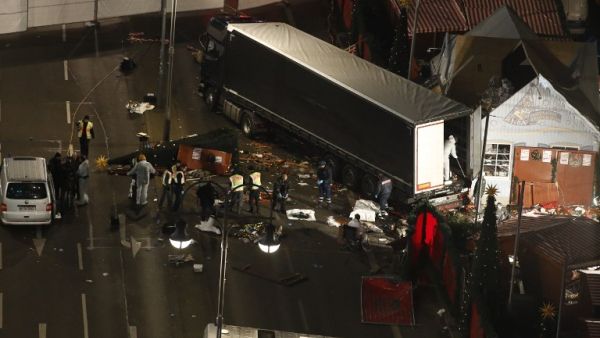Twelve people were killed and 48 others injured late Monday when a truck ploughed into a crowded Christmas market in Berlin, in what officials suspect was a terrorist attack.
The truck drove between 50 and 80 metres through the market at the historic Kaiser-Wilhelm Memorial Church, adjacent to the Kurfuerstendamm, one of the city's most popular shopping streets at around 8 pm (1900GMT).
The suspected driver, who fled the scene, was taken into custody shortly afterwards a few kilometres away.
The man detained likely came to Germany as a refugee in February and was either from Afghanistan or Pakistan, a security source told dpa, adding that the man had used different names, which was making his identification more difficult.
Interior Minister Thomas de Maiziere refused to label the deadly incident a terrorist attack, though he said "a lot points in that direction."
"We want to be very, very cautious and operate close to the investigation results, not with speculation," he told the ARD broadcaster.
A man found dead in the passenger seat of the truck, which was owned by a Polish company, was later identified as a Polish citizen. It was not clear how he died.
The company's owner, Ariel Zurawski, told Polish broadcaster TVN 24 that the truck had earlier in the day been driven by his cousin, who had been transporting steel to Berlin and had not been reachable since 4 pm.
He said he was sure his cousin was not an attacker. "It can't have been my driver," he said. "Something must have happened to him ... I am so shocked."
German police said later they were working on the assumption that the truck had been stolen from a construction site in Poland.
Amateur videos allegedly taken directly after the attack and aired on several German broadcasters showed injured people lying on the ground against the backdrop of police sirens.
"We are mourning the dead and hope the many people injured can get help," German Chancellor Angela Merkel's spokesman Steffen Seibert said on Twitter.
Security had been increased at many of the nation's Christmas markets this year, according to a recent dpa survey, amid fears they could be a target for terrorists.
A large number of streets were cordoned off around the church on Breitscheidplatz late Monday, while police patrolled the area with machine guns.
But Berlin's mayor Michael Mueller said the situation in the capital was under control after the deadly attack.
"What we are seeing here, is dramatic," said Mueller at the scene. His thoughts were with the families of the dead and injured, he said.
Berlin police warned residents to remain indoors and to avoid spreading rumours about the attack.
If established as a terrorist attack, the incident will come less than six months after two attacks in Germany inspired by the Islamic State extremist group and the Bastille Day attack in France, which left 86 dead.
In July, a 17-year-old claiming to be an Afghan asylum seeker attacked passengers on a Bavarian commuter train with an axe and a knife.
A week later a 27-year-old Syrian asylum seeker blew himself up outside a music venue in the Bavarian town of Ansbach, injuring more than a dozen people.
A 12-year-old boy with dual German-Iraqi citizenship also allegedly attempted to explode a nail bomb at a Christmas market in the western German city of Ludwigshafen a few weeks ago.
Christmas markets have a long history in Germany stretching back to the Middle Ages. However, more recently they have grown dramatically to become popular places to socialize – to drink mulled wine and to eat snacks in the weeks running up to Christmas.







